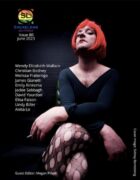I love that “Birdsong” is a sad dog story, but not in the way readers expect. When I read the dog’s name, Wyeth, I imagined Andrew Wyeth paintings. How did Wyeth get her name? What kind of dog was she?
One of my mother’s favorite novels is Play It as It Lays by Joan Didion. Maria Wyeth is the centralized character of the book, hence the name Wyeth of her dog. She’s a beagle, barks at everything. She has a very nervous energy. She must think she’s a model, how she poses for photos. Everyone mishears her name, thinks she’s a male. “Good boy, Wyatt,” they say. “Wyeth,” we correct them.
I’m impressed by how well you developed the mother’s character in such a short space. What is your process like for showing a personality so succinctly?
I’m not sure how to best answer this. I want to honor the people I know, the characters I make of them, even a complete fictionalization can be a best friend. After all, as children it is common to have an imaginary one.
You’ve published poetry in Ninth Letter and Hobart, and I see echoes of your poetic voice in “Birdsong.” What similarities and differences do you see in flash nonfiction and poetry?
For me, essays are happenings, seeking survival and asking what that means. Like poetry, insofar as to summarize is to fall short, sometimes incorporating the use of white space, lyricism, etc., like fiction, free to roam with all of the liberties of narrative and fail: Memory isn’t perfect; interpretations are just that.
I’m nearly finished writing a collection of experimental essays/memoirs that collide into magical realist and uncanny fictions to create a world of literary distortion, for metaphorical resonance, and to rewrite personal traumatic narratives. I love the nakedness of nonfiction and I needed a way to give the reader and myself air from the harrowing depths of trauma and addiction. I find the veil of fiction and poetry (as well as accessing the imagination) to be a great relief—but for my first full-length book, I didn’t want a veil. The reader is well aware of when moments are fictionalized. Their purpose is metaphorical as well as intentional: The truth is stranger than fiction.
In terms of the similarities and differences between flash nonfiction and poetry, I suppose it depends on that veil. Otherwise, I find genre to be an invisible boundary begging to be crossed or adhered to contingent upon the piece and what it asks of me.
One gorgeously haunting part of “Birdsong” is the way you use sound to develop character and plot (the phonetic discussion of the word violence, the question “what sound does survival make?” and the title, “Birdsong,” itself.) Why did you choose to privilege the soundscape in this piece?
I am a lover of language and therefore a firm believer in lexical pleasures. So much of my recent writing is an excavation of traumatic past, hoping to transform it through formal/structural innovations as if, in writing it, the past can stop its death grip of the present. This relates to sound and silence, how the body keeps score, and what it means to have a voice, the agency and self-advocation in speaking up and out and away (as well as intoning.). In “Birdsong,” it was imperative that I explore these facets, their resonance, and allow the shortform of the microessay to embody these profundities: how a voice soars from the belly, how the air can feel like water, like concrete, and how the past, present, and future seem to be happening all at once. After all, “Birdsong” is primarily a single scene, a finite moment gesturing for so much more.
Mother says, “she doesn’t want another dog” after Wyeth dies. Did you get another dog after Wyeth? Do you have a dog now?
Wyeth is still alive and well and barking out the window at everyone and everything. To be honest, if Wyeth passes, I would be surprised if my mother gets another dog. But maybe it’s in her continuous refusal, that deep down, she appreciates their company, a woman’s best friend, and what it means to not be alone.



 The core workshop of SmokeLong Fitness is all in writing, so you can take part from anywhere at anytime. We are excited about creating a supportive, consistent and structured environment for flash writers to work on their craft in a community. We are thrilled and proud to say that our workshop participants have won, placed, or been listed in every major flash competition. Community works.
The core workshop of SmokeLong Fitness is all in writing, so you can take part from anywhere at anytime. We are excited about creating a supportive, consistent and structured environment for flash writers to work on their craft in a community. We are thrilled and proud to say that our workshop participants have won, placed, or been listed in every major flash competition. Community works.